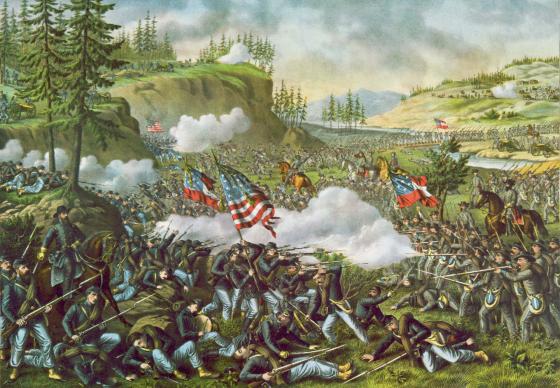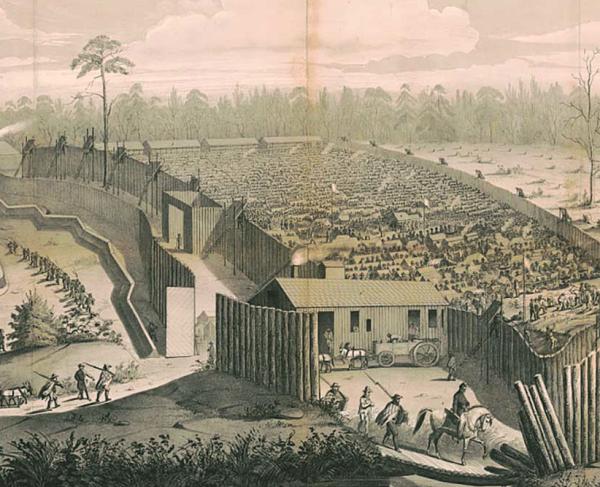Book: In the Very Thickest of the Fight

“In the Very Thickest of the Fight: The Civil War Service of the 78th Illinois Volunteer Infantry Regiment” is Steve Raymond's examination of the accomplishments of the 78th Illinois Volunteer Infantry Regiment. Civil War Trust staff sat down with the author, Trust member and long-time supporter of battlefield preservation to discuss the book.

Civil War Trust: This book is a departure from your previous works. As a Trust member and Civil War enthusiast, is the war something you’ve always planned to tackle at some point?
Steve Raymond: I’ve been a student of the Civil War ever since I lived in Yorktown, Virginia, as a boy. My father was an Army officer who was deeply interested in the Civil War, and we spent nearly every weekend tramping battlefields. I was too young to realize it at the time, but all that history was rubbing off on me. Since then, however, I’ve spent most of my life in the Pacific Northwest, far from the battlefields, so the opportunity to write something about the war seemed beyond reach—until I stumbled onto the story of the 78th Illinois.
How big a factor was the timing of the release of this book?
SR: For me, it was a big factor. I wanted the book to be published on the 150th anniversary of the mustering-in of the regiment, which took place September 1, 1862. With the cooperation of the publisher, we were able to do that.
How important was the use of perspective in writing this book? Why was it important for you to tell the story of the 78th Illinois Infantry Regiment through a day-to-day account of their service?
SR: I suppose I was influenced by the format of many regimental histories written during or immediately after the war, which presented their stories in day-by-day accounts. But since the 78th Illinois had previously virtually escaped mention in Civil War literature (probably because it never had its own historian), I also felt it was important to tell the full story of the regiment, which meant chronicling most of its daily existence.
How significant were the actions of the 78th Illinois Regiment to the Union war effort?
SR: The 78th played a critical role in the defense of Horseshoe Ridge at Chickamauga, even though it was the regiment’s first real test of combat. It performed heroically at Kennesaw Mountain and in a historically overlooked battle at Peachtree Creek, the day before the battle of that name described in all the history books. It also played a critical role during the second day’s fighting at Jonesborough, where it captured a six-gun battery and a Confederate general. Finally, along with its sister regiments it fought its way out of a desperate situation at Bentonville, where it was virtually surrounded.
What do you consider the greatest achievement of the 78th Illinois Infantry Regiment?
SR: Its greatest achievement may not have been on the battlefield. That achievement was surviving its first year under command of a lackadaisical colonel who feuded with his own officers and superiors, got himself placed under military arrest, was frequently absent from the regiment, and neglected nearly all his duties. Despite that, and mainly because of the efforts of the regiment’s second in command, the 78th developed into a well-drilled and disciplined regiment that was able to respond gallantly when finally called upon to do so.

How do you think this book will impact the future of the study of the 78th Illinois Infantry Regiment – or for that matter, the various battles in which they were involved?
SR: Since the 78th Illinois is virtually unmentioned in previous Civil War literature, it is my hope the book will bring the regiment’s story to the attention of Civil War scholars and casual students alike. I am already seeing some evidence of this in letters and e-mails from persons who have read the book, especially descendants of soldiers who served in the 78th. Several have collections of letters or diaries that were not available to me when I was researching the book, and are eager to share them. I hope this additional material will add to our knowledge of this previously “lost” regiment.
The book also describes elements of the battles of Chickamauga, Kennesaw Mountain and Jonesborough—especially the latter—that have not been reported previously, and I hope this will stimulate renewed interest in these conflicts.
What is one of the most crucial facts readers will discover when reading this book about the daily life of a soldier in the Army of the Cumberland?
SR: Most people who read the book come away deeply impressed by the way soldiers endured the misery and monotony of their daily lives—endless drill, poor food or none at all; dirty, tattered uniforms filthy with lice; weather that was too hot and dry, or too wet and muddy, or too cold; bad water; countless flies, chiggers, ticks, mosquitoes and scorpions; illnesses; interminable marches with too little rest, and so on and on. The diaries and letters of the soldiers of the 78th reveal how they endured these things stoically and seemed to accept them as simply part of the lot of a common soldier.
Bottom line: They were tough. They had to be.
Do you have a favorite story of this regiment?
SR: I’m not sure “favorite” is the right word, but I have always been fascinated by the poignant story of Perry Lesure, a private in Company K. Private Lesure enlisted on a whim, and his parents were horrified when they found out. They were getting on in years, Perry was their only son, and they needed him to help out at home, so as soon as they learned he had enlisted they began a campaign to have him discharged. It continued for two years, until September 1, 1864, the regiment’s second anniversary. That morning Private Lesure’s discharge papers were received by the regiment. He could have turned in his musket and started for home immediately, but he was reluctant to leave the men with whom he had served for two years; they were like brothers. So he decided to stay with the regiment at least for the rest of the day, just to see what the day might bring.
What it brought was the second day of the Battle of Jonesborough, and the 78th charged the angle of the Confederate line north of the town, manned by part of Patrick Cleburne’s division. Private Lesure didn’t have to take part; his comrades tried to talk him out of it. But he decided to go anyway. It was the only instance in the Atlanta campaign where a Union force defeated Confederates fighting from behind breastworks. The regiment lost heavily in the assault, although Company K had only one man killed. When the fighting was over, Private Lesure’s comrades found his body on the field, with his discharge papers still in his pocket.
How did this regiment grow from their time occupying Kentucky and Tennessee to the Battle of Bentonville?
SR: As previously mentioned, it grew from the efforts of its second in command, Lt. Col. Carter Van Vleck, who built the regiment into a well-drilled, well-disciplined force, and finally took command after the resignation of the regiment’s original colonel. After that it grew from experience, as all regiments did in battle, even as it lost many men through disease and battle casualties. By the time of Bentonville it had been reduced in numbers to the point that some of its companies had to be consolidated. By then, however, the regiment was so battle-hardened that there was no trace of panic when it was surrounded by Confederates and came under attack from both front and rear. The 78th defended itself by jumping back and forth over hastily erected breastworks and firing in both directions. With its sister regiments, the 78th held its ground until the Confederate assaults died away.
Buy the Book: “In the Very Thickest of the Fight” is available in our Civil War Trust-Amazon Bookstore
Steve Raymond, a retired newspaper editor, is author of nine previous books. A member of the Civil War Trust and Puget Sound Civil War Roundtable, he also reviews books on history for the Seattle Times and is a member of the National Book Critics Circle. He and his wife, Joan, live on Whidbey Island in Puget Sound.
Related Battles
1,149
2,000


